Movies
One-on-One Interview with Producer Ilya Salkind
By Barry M. Freiman
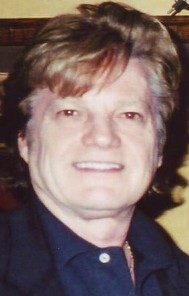 While every hero needs a villain, in real life the lines between altruist and antagonist often blur. Consider that moment from 1983's "Superman III" where the hero must battle his own subconscious for moral supremacy. Had a similar confrontation taken place in Producer Ilya Salkind's life (incidentally Salkind conceived the Superman versus Superman story for the sequel uncredited), Salkind believes that the good guy won just like in the movie.
While every hero needs a villain, in real life the lines between altruist and antagonist often blur. Consider that moment from 1983's "Superman III" where the hero must battle his own subconscious for moral supremacy. Had a similar confrontation taken place in Producer Ilya Salkind's life (incidentally Salkind conceived the Superman versus Superman story for the sequel uncredited), Salkind believes that the good guy won just like in the movie.
"You're going to be on that white side or... on that black side and I thank God I'm now completely on the white side," Salkind joked during a recent interview.
Salkind, 58, conceived of the idea to do a big-budget "Superman" movie, and, along with his late father, Alexander, and childhood friend, Pierre Spengler, co-produced the first three "Superman" movies and "Supergirl", and also produced the television series "Superboy" (later the "Adventures of Superboy") for syndication.
Without Salkind's germ of an idea, there would never have been a "Superman" movie franchise. Christopher Reeve would likely have continued to evolve as a competent soap opera actor and Broadway staple. There would have been one less "blockbuster" in the triumvirate -- that also includes "Star Wars" and "Close Encounters of the Third Kind" -- that helped usher in a new era of film-making that respected and exalted science fiction, fantasy, and adventure stories. And the plethora of big budget comic book movies that have followed - "Batman", "Hellboy", "Daredevil", "Spider-Man", "X-Men", "Men in Black", to name a few - would never have been made (not to mention a little project called "Superman Returns").
A Producing Pedigree
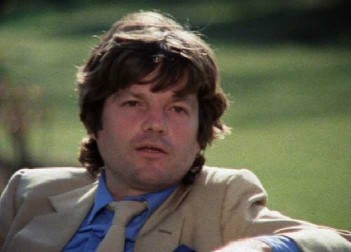 Like Superman himself, Salkind's destiny was laid out years before he was born. Salkind's grandfather, Mikhail, produced one of Greta Garbo's first films ("The Joyless Street") in 1925 when Salkind's father, Alexander, was only four years old. Mikhail continued producing movies and Alexander joined the family business. "My grandfather was the creative man, my father was the financial man," Salkind related.
Like Superman himself, Salkind's destiny was laid out years before he was born. Salkind's grandfather, Mikhail, produced one of Greta Garbo's first films ("The Joyless Street") in 1925 when Salkind's father, Alexander, was only four years old. Mikhail continued producing movies and Alexander joined the family business. "My grandfather was the creative man, my father was the financial man," Salkind related.The family eventually relocated from Europe to Mexico. In the early 1940s, Alexander met Berta Dominguez, a Mexican-born poet and playwright. He married her shortly thereafter and, in 1947, son Ilya Juan Salkind Dominguez was born.
The relationship between Alexander and Berta was at times volatile and they eventually split. In the 1950s, a young Salkind spent a tentative year living with his reunited parents in the United States. It was then he had his first introduction to Superman.
"As a child, I [spent] a year in New York and it was a relatively tense time in my childhood between my parents," Salkind explained. "But it was a kind of wonderful year [too] because they got together again and there was a wonderful Christmas. I spoke a little English, but there I also picked up Americana-English as well as comic books and all that, so I'd say that's really where the Superman thing started in my subconscious."
Salkind also recalled watching first-run episodes of TV's "Adventures of Superman" series starring George Reeves. "I saw George Reeves. I'm not that old," Salkind laughed.
Salkind eventually joined his father and grandfather in the family business. The first picture that had the junior Salkind earning an Associate Producer credit was 1971's "The Light at the Edge of the World". He followed that up by serving as an Executive Producer on 1972's "Bluebeard".
Three generations of Salkinds then brought "The Three Musketeers" to the screen in 1973. The Salkinds retained director Richard Lester (who would later direct "Superman II") to film both "The Three Musketeers" and "The Four Musketeers" at once. By this point, Salkind's childhood friend Spengler had also joined the Salkind production team. Both "Musketeers" films were financial and critical hits.
With this success, however, the Salkinds also took their share of blows. Litigation arose over exactly how many films the Salkinds intended to shoot when they started work on the "Musketeers" movies and how many films the actors and crew were being compensated for. This resulted in the Screen Actors Guild requiring that every SAG contract contain a "Salkind Clause" which requires that an actor be compensated for each film that he or she is making.
Also in between the release of the two "Musketeers" movies, grandfather Mikhail died. Salkind assumed his grandfather's creative seat in the family business.
Making Believers
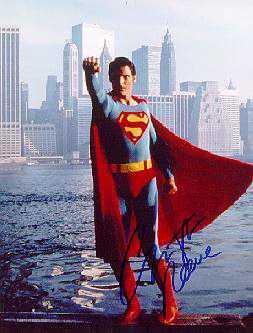 After the first "Musketeers" film's success, Salkind joined his father for dinner in Paris to discuss their next project. A few days before that meeting, Salkind had been walking around Paris when a billboard put him in a hero state of mind. "The clearest memory I have - this is late [19]73 - is I'm walking [in] Paris and seeing a billboard of Zorro - that film was a French film [of Zorro] and featuring a local French star - I just digested that," Salkind said. So with a costumed hero in mind and ready to produce another film with a big American audience, Salkind suggested "Hey, let's do Superman."
After the first "Musketeers" film's success, Salkind joined his father for dinner in Paris to discuss their next project. A few days before that meeting, Salkind had been walking around Paris when a billboard put him in a hero state of mind. "The clearest memory I have - this is late [19]73 - is I'm walking [in] Paris and seeing a billboard of Zorro - that film was a French film [of Zorro] and featuring a local French star - I just digested that," Salkind said. So with a costumed hero in mind and ready to produce another film with a big American audience, Salkind suggested "Hey, let's do Superman."The first problem was selling the elder Salkind on the idea. Alexander had never heard of Superman having been born in Europe 17 years before 1938's Action Comics #1 introduced Superman to the world. "So I said that the man flies, does good, he's incredible. And [my father] said 'interesting, interesting'. He is also possibly one of the most known figures in humanity. Chaplin, Jesus Christ, Gandhi, Elvis, I mean he's up there. And he said 'interesting, interesting'. And I said how he was powers. He looked at me like I was a little crazy...." With the younger Salkind's successful track record, Alexander agreed to consider the idea.
"So I went to talk to [my father's] different buyers and backers and he came back about three days later and [said] 'you know they think it's very interesting stuff.... [E]verybody knows [the] title [Superman]." Alexander was sold on the idea. "[M]y father was an optimist and a positive man - so am I," he said.
Very quickly, the optimistic Salkinds met resistance from producing partner Spengler who doubted that special effects could make anybody believe a man could fly. According to Salkind, "[Spengler] said being much more pragmatic and less, let's say, optimistic, and more on the technical side, 'we'll never make him fly' and my father and I said 'come on, you're always such a downer.'" Team Salkind persevered.
The next hurdle involved acquiring the rights to the characters. At the time DC Comics was known as National Periodical Publications. They had recently been acquired by Warner Brothers as a wholly owned subsidiary of Warner Publishing.
The Salkinds initially negotiated directly with DC. "We started talking with a guy named Bernie Kasden and it was a very complex contract. They were coming back on these crazy controls on the character to a point that it became impossible to make a movie. So the deal almost fell through," Salkind recounted.
"Then my father said that we [have to] cut through, we [have to] go to the top because this is never going to work. So we called the head of publishing of Warners... and of course in two minutes, the deal was done."
The contract gave the Salkinds the right to produce "Superman" film and television properties for 25 years. Although Warner Brothers owned the rights to the Superman family of characters since they acquired DC in the early 1970s, the company had no interest in bringing those characters to life on a movie screen. The live-action "Batman" television show had left a taint on film depictions of comic book super-heroes. Warner "absolutely didn't think it was worth it," Salkind maintained.
In theory the Salkinds had "access to any character that had appeared in a comic book with Superman." This part of the contract was most telling about Warner's own disbelief in the viability of a comic book film property. The Salkinds had access to Superman's supporting cast of good guys such as Lois Lane, Jimmy Olsen, Perry White, Supergirl, Superboy, and Krypto the Superdog. They also had access to the villains like Luthor, Brainiac, and Mr. Mxyzptlk. Beyond the characters typically associated with Superman, however, the contract was so open-ended that Salkind believed it gave them the right to include any character that had appeared in any Superman comic book including team books like Justice League of America and World's Finest. "We could've had Wonder Woman in a Superman movie," Salkind explained. "Same with Batman or Flash. Definitely we could not do Batman on his own, but we could surely [have] put him in [a Superman movie]."
Warner essentially held a right of first distribution on any "Superman" films made by the Salkinds. "We finance the film entirely under certain parameters that the studio agrees, like stars and budget," Salkind explained. "The fact is it's an Alexander Salkind presentation released by Warner Brothers so it's our film." The substance of this arrangement whereby the Salkinds produce and Warner may distribute is known as a negative pickup.
Warner retained the power to have input into the production through DC Comics. "They [Warner] had that clause that [DC] could intervene, but, as I got friendly with them, we worked very well together - [Carmine] Infantino first and then Jenette Kahn came in later. And they were more than helpful. [Mario] Puzo spent time with them. The Newmans. Everybody." Salkind maintains that he still has good relations with DC management.
Finding a Director... Twice
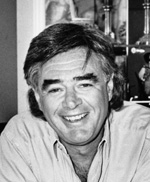 The Salkinds retained "Godfather" scribe Mario Puzo to write the "Superman" screenplay. "When I said let's make a film, let's make a serious film. I never said let's make a camp film," Salkind explained.
The Salkinds retained "Godfather" scribe Mario Puzo to write the "Superman" screenplay. "When I said let's make a film, let's make a serious film. I never said let's make a camp film," Salkind explained.Puzo produced a 500-plus page script that eventually became the "foundation" of 1978's "Superman" and 1980's "Superman II". "We had absolutely decided to make two films because [Puzo's] story was a saga," Salkind recalled.
As Puzo worked on the script, Salkind searched for a director. "Everybody or I would say a lot of them [directors at the time] were very interested. Peter Yates, Sam Peckinpah.... My God, we met a lot of guys, very interesting people. We went to [William] Friedkin, we went to [Francis Ford] Coppola, we went to everyone.... Yates really wanted to do it."
Then there was a relatively new director named Steven Spielberg whose agent kept calling Salkind. "Spielberg was really in the beginning," Salkind said. "He absolutely wanted to make the film."
At the time, Spielberg was still working on 1975's "Jaws" and was largely an unknown. His representation called Salkind repeatedly in Paris. According to Salkind, they told him "'We have this kid who wants to direct 'Superman', he loves Superman, that's his kind of stuff and he wants to do it.' Of course I immediately checked what he had done and went to see his films and immediately said 'OK, this kid's got it - this guy's got talent.' And I went to my father and I said 'Look this is the guy'."
Alexander wasn't convinced. He was concerned because he'd heard Spielberg was over-budget on "Jaws". The younger Salkind was convinced "Jaws" would be a hit regardless. Spielberg also had Spengler's support. Ultimately, Salkind recalled that his father concluded "'let's wait until the big fish opens.'"
"Jaws" opened in summer 1975 and Alexander naturally changed his mind about Spielberg. "I said 'look, he's never going to do it'" now that "Jaws" is so huge. Salkind contacted Spielberg's agent but their window of opportunity had closed. "I called [Spielberg's] agent and the agent said... [he wanted] to do Superman singing and dancing, which was really a very polite way of saying [no]. And I understood it immediately."
The Salkinds eventually agreed on a director. Salkind met director Guy Hamilton early on in the search and they immediately clicked. Hamilton had previously directed 1964's "Goldfinger" which Salkind believed to be "one of the best 'Bonds' and immediately I went to see 'The Battle of Britain' which was really a good solid film."
By this time the project had moved from Paris to Rome, Italy. "We started working with Guy - that was when we tested [Olympic athlete Bruce] Jenner." They also began to seriously consider how to make Superman fly. "Of course nobody knew how to make the guy fly whatever my optimism," Salkind said. "In Italy, we lost about $2 million [on flying tests]."
Also in 1975, the Salkinds hired Marlon Brando and Gene Hackman and flew airplanes over the Cannes Film Festival in France announcing that "Superman" was coming with stars Brando and Hackman and writer Puzo. Salkind credits his father with securing the project's startup costs. "[My father] really had an extraordinary ability to get people interested. Most importantly, he found the development money to hire Puzo, to hire Brando," Salkind said. "And in those days we were outsiders because we were first based in Paris, then in Rome, then in London."
With Hamilton, the Salkinds had assembled two huge stars for the cast and much of the crew who would go onto make the film. "We had everybody except John Barry and [Geoffrey] Unsworth at that time with [Hamilton]," Salkind said, including Derek Meddings on model effects, Wally Veevers on flying effects, special effects supervisor Roy Field, and costume designer Yvonne Blake. "So it was already a very good group."
Unfortunately Brando couldn't shoot in Italy and so the production had to move to England. "Marlon couldn't shoot in Italy because of the lawsuit he had [there] over 'Last Tango [in Paris]' over obscenity," Salkind said. Hamilton was a tax exile from the United Kingdom and "he just couldn't do it [in the U.K.] because of the tax situation for him." Hamilton left the project. "[W]e parted very friendly," Salkind remembered. "[He] was just a wonderful guy."
The production moved to Shepperton Studios, which they quickly concluded was too small, finally settling in at Pinewood Studios. Salkind began looking for a new director. "[O]ne was a guy we were already talking to and I had approached was Mark Robson who had done [1974's] 'Earthquake'. And he was gung-ho, crazy to do it."
Then Salkind's wife at the time, actress Skye Aubrey (Aubrey's mother, Phyllis Thaxter, played Martha Kent), suggested Salkind see "The Omen". Aubrey knew the film's director Richard Donner. "She said this kid is great," Salkind recalled.
Salkind and his father saw "The Omen" and liked what they saw. "I said the film works on all levels," Salkind remembered. "The Omen" was Donner's breakout hit and he had only directed two films before that as most of his experience up until that point had been in television. "I went to see his other films which I always do. They were absolutely dreadful." Nonetheless, Salkind saw that one of Donner's two previous films "had heart" and, according to Salkind, "'The Omen' had it all in terms of energy."
Salkind whittled his choices down to Donner and Robson. "Warners was ambivalent but not against either," Salkind explained, "and Marlon didn't give a sh*t." Eventually they chose Donner.
As Donner explained on the 2001 Special Edition "Superman" DVD, he brought in Tom Mankiewicz to rewrite parts of the script which had already seen revisions from writers Robert Benton and David Newman (Newman's wife Leslie joined the project later to "write Lois"). The Writers' Guild gave writing credits on the film to Puzo, Benton, and the Newmans. Mankiewicz received a credit as "Creative Consultant".
Salkind acknowledges that Mankiewicz "did some great, great stuff", but suggests that the interviews on the 2001 DVD may have failed to recognize the contributions made by the film's other writers. "If you compare [earlier scripts] to the Mankiewicz script, frankly, it's surprising how little changes there were to the dialogue. Things have to be said true the way they are. I had forgotten myself and re-read the Newman script. [A]ll that stuff [on Krypton] was the same, the entire Lex Luthor thing. Tom did some great, great stuff but there was a lot of great stuff [already]."
"The whole 'pink' [Lois interviewing Superman on her balcony] and all that - that's all [the Newmans]. We tested with that and Tom wasn't working yet," noted Salkind. "We had agreed that Tom could come to work on the project [by the time we started screen tests] but the script was pretty solid."
Meeting with Marlon
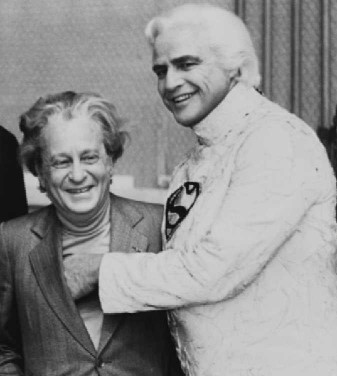 As the shoot neared, Salkind, Donner, and Mankiewicz went to meet with Brando to discuss costumes. "We arrived at his house in Mulholland which was very nice. It was extraordinarily organized. I was surprised by that." Brando kept them waiting about an hour, and then surprised them. "He made us wait for an hour and of course we're looking at the front door and a little door opens in the back. So of course we turn around and it's Marlon Brando."
As the shoot neared, Salkind, Donner, and Mankiewicz went to meet with Brando to discuss costumes. "We arrived at his house in Mulholland which was very nice. It was extraordinarily organized. I was surprised by that." Brando kept them waiting about an hour, and then surprised them. "He made us wait for an hour and of course we're looking at the front door and a little door opens in the back. So of course we turn around and it's Marlon Brando."Brando followed his surprise appearance with a proposed disappearance. He suggested - strongly - that Jor-El could be a suitcase or a green bagel that spoke with Brando's voice. Salkind recalled, "I was really young and I was sweating it out. I said 'My God, this is finished, the movie will not happen.... The man will destroy everything. This is impossible. Jor-El will be a bagel.'" Salkind laughed as he recalled the meeting.
As Salkind felt himself giving into Brando's outlandish proposals, Donner took the lead. "Dick hit me on the leg and I saw he was calm as hell. Marlon after this long rambling, he just looks straight at Donner and he says 'Don't you think it'll be great Dick?' And Donner said 'Marlon, I think that people want to see Marlon Brando playing Jor-El. They don't want to see a green bagel.' So that was it. There was never another problem with Marlon - he even gave [the production] a free day."
Brando worked on the production for less than two weeks and earned $3.7 million up front, plus 11.75% of the gross profits from the film. "He made $19 million," Salkind calculated. Salkind joked that "Paul Newman found out later and he almost had a heart attack." Newman had early on turned down all three male leads (Jor-El, Lex Luthor, and Superman) and would have earned a similar compensation package to Brando's.
Though Brando sued the Salkinds shortly before the film opened, Salkind recalled that "everything was settled and everyone got their money." Salkind remembered the late Brando fondly from their work together on "Superman" and 1992's "Christopher Columbus: The Discovery". "The relationship [with Brando] was excellent," Salkind said. "Later the relationship became even better between him and me because we did 'Columbus' - and that's where I discovered how sad the man was.... I really found some tremendous insights on the man, a very lonely man, a very sad man."
A Very Super Man
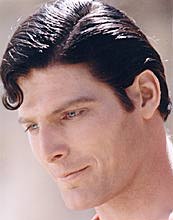 Meanwhile efforts to cast Superman and alter ego Clark Kent reached a fever pitch. In addition to leading man Newman, the Salkinds considered other established actors like Steve McQueen, Burt Reynolds, and Jon Voight. "Neal Diamond wanted to play it," Salkind recounted. So did bodybuilder turned actor turned California Governor Arnold Schwarzenegger. "When I met [Arnold] at the premiere of the first film, he said 'Ahhh I should've been Superman'", Salkind said, adding, "With that accent... not too good."
Meanwhile efforts to cast Superman and alter ego Clark Kent reached a fever pitch. In addition to leading man Newman, the Salkinds considered other established actors like Steve McQueen, Burt Reynolds, and Jon Voight. "Neal Diamond wanted to play it," Salkind recounted. So did bodybuilder turned actor turned California Governor Arnold Schwarzenegger. "When I met [Arnold] at the premiere of the first film, he said 'Ahhh I should've been Superman'", Salkind said, adding, "With that accent... not too good."Casting director Lynn Stalmaster introduced Salkind to the late Chris Reeve. Salkind remembered meeting Reeve with Donner in New York about five months before shooting began with Brando. "[Chris] was terrific but was extremely skinny. Six-four, but like a string bean. So we went back. Then we tried more people."
Casting became so desperate that a full screen test was arranged for Salkind's wife's dentist who bore a striking resemblance to Superman. "Then I was looking every night at this almanac [of actors' headshots] and I would look at this Reeve.... I would say 'Jesus this guy looks so good' and also he's got this neck, he had this big neck, and Superman has a big neck. So then I said 'Why the hell couldn't he be built up?'"
Salkind convinced Donner to give Reeve a screen test. "Chris came over to London and they put him in makeup and Pierre Spengler's wife at the time, Monique, saw him. Pierre called and said 'you know Monique says he's really sexy' so I said 'uh-huh, very good.' That was a very good start. Ten minutes after, [Donner] called and said 'We got our Superman.'" Portions of Reeve's London screen test are included on the 2001 DVD.
Immediately they paired Reeve up with bodybuilder David Prowse (who wore the Darth Vader suit in "Star Wars") to bulk up his physique. "We still had some time," Salkind said, remembering that "Brando shoots and then there was a little hiatus." The one scene shot between Brando and Reeve didn't require that Reeve be bulked up - this was a scene from "Superman II" that didn't make the final cut where Jor-El gives his spiritual life to re-power a de-powered Superman.
Salkind never doubted Reeve would return with a physique befitting Superman. "I had already met the guy enough to know the kind of personality he had. Chris was a doer, he was a guy who had an extraordinary sense of discipline and that's the way he was." Reeve died in 2004.
The production also resolved the question of how to make audiences believe a man could fly. According to Salkind, co-producer Spengler found inventor Zoran Perisic who came up with a front projection technique for shooting the flying sequences.
At the same time that shooting was underway on the first two "Superman" movies, 20th Century Fox and Columbia were working on "Star Wars" and "Close Encounters of the Third Kind". Along with "Superman", these films changed the way Hollywood made movies. According to Salkind: "It is crucial and it has been said, but not enough, that I did not know about 'Star Wars'; 'Star Wars' did not know about 'Superman'; 'Close Encounters' did not know about 'Superman.' It really was completely independent - nobody knew anything about anybody."
"It was a whole interesting phenomena that started happening," Salkind explained. "And if one thinks about it, it was just doing these big movies but doing them pretty well. Literally doing the B movies of the old serials and doing them A."
Dance of the Directors
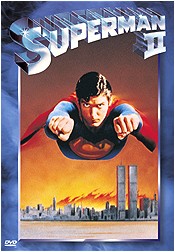 The Salkinds originally retained Donner to direct "Superman" and "Superman II" simultaneously. Budget over-runs and personality conflicts eventually led the Producers to replace Donner with Lester. Lester had previously directed "The Three Musketeers" and "The Four Musketeers" for the Salkinds and joined the "Superman" production as an "uncredited producer and intermediary."
The Salkinds originally retained Donner to direct "Superman" and "Superman II" simultaneously. Budget over-runs and personality conflicts eventually led the Producers to replace Donner with Lester. Lester had previously directed "The Three Musketeers" and "The Four Musketeers" for the Salkinds and joined the "Superman" production as an "uncredited producer and intermediary."Though Lester initially joined the project to mediate between the director and the producers, Salkind acknowledges that bringing a second director on-set meant there was someone ready in the event Donner couldn't fulfill his directing duties. "Being there all the time meant he [Lester] could take over," Salkind admitted. "[Donner] couldn't make up his mind on stuff."
"Lester contributed two gigantic ideas," Salkind explained. "Drop the second part because we had missed summer [19]78 and take the end of the second part for the first part." This permitted Donner to finish the first film without worrying about filming for the second, with the rationale being that, if the first film bombed, there'd be no reason to have a second film ready to go. After the first film's December 1978 release, work resumed on the sequel with Lester in the director's chair.
Salkind believes Donner brought "tons of... good things" to the first film's arduous production. "The tensions were terrifying [on "Superman"]. The fact is Dick was over everything, it was so big, we had seven units at one point. And he couldn't decide which was normal and I was many times on [Donner's] side because I'm also more of a creative producer. So we were all going nuts. And of course the film was going up and up and up in cost and there were enormous problems with the flying that had nothing to do with [Donner] or with me or with anybody."
Tensions rose - in particular between Spengler and Donner - as the first film went over-budget. "My father was breathing down my neck," Salkind recalled. As the production required more money, Warner Brothers invested some of its money which threatened to dilute the Salkinds' control.
After the first movie opened, Salkind recounted that Donner told the Press that "'I'll do 'II' but it's my conditions; if not I won't do it'.... Then he called us a**holes publicly. We can't work with this guy if the guy hates us so then we said let's go and see Lester."
Salkind responded to Donner's insistence in interviews over the years that no one ever contacted him to let him know he wouldn't be returning to finish "Superman II". According to Salkind, Spengler actually tried to call Donner "two or three times to try to say Dick, let's work together, let's bury the hatchet." Salkind remembered that Donner "actually disappeared" during this time and that no one could find him. "That's when, finally, we said 'OK, let's make the film ['II']" with Lester.
The original idea was to end the first film with a cliffhanger - the first of the two nuclear rockets that Superman threw into outer space explodes and frees the three Phantom Zone villains. After the Salkinds decided to hold off finishing "Superman II" till after the first film's release, they reasoned it made more creative sense to present the sequel's story independently of the first film. This necessitated plot changes such as the addition of the scene where terrorists attempt to hold Paris hostage, which inadvertently results in the freeing of the Phantom Zone baddies, and the deletion of scenes that referred to events from the first film as being recent.
One of the most significant changes to what had already been shot by Donner, however, concerned the decision to cut Brando out of the sequel completely. Salkind acknowledges the decision to cut Brando was partially financially motivated. Had Brando appeared in even one shot of "Superman II", it was likely he would have been entitled to the same 11.75% back-end participation that he received on the first film.
"Of course the 11 points had a lot to do with [cutting Brando]," Salkind admitted. However, Salkind insists that they never would have cut Brando out of the film had it not made creative sense. Salkind remembered suggesting to his father "What if it's the mother [instead]? She talks about love to her son. And it kind of made sense creatively.... Jor-El had done his thing if you want."
Salkind described the scene where Jor-El gives his spiritual life so that Superman could get his powers back. "The scene with Brando putting his finger out and it's [like] the famous Michelangelo [image]... it was over the top, it was too much. Already there were so many messianic tones that were absolutely clear and intended since the beginning."
The sequel lost one more participant from the original - conductor John Williams whose original score was adapted for "Superman II" by Ken Thorne. Salkind recalled that Williams was set to return until an unfortunate happenstance. "John Williams came to London, we paid [for] the trip. He saw the [second] film. I made a mistake. I let him alone with Lester in the screening room and somehow Lester and him did not hit it off at all. At the end of the screening, John said 'Ilya can I speak to you?' He said 'Look I cannot work with this man.' That was it."
"Superman II" was a tremendous hit with audiences and critics, earning a domestic gross of over $108 million. As for which of the first two films Salkind favors, he remains mum. "I think both movies are great," he said.
One More Time
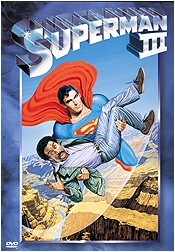 A follow up to "Superman II" was a fait accompli with the very first closing credit after Superman's traditional swing over the Earth reading: "Coming Soon: Superman III". With the expansive DC Comics library of Superman villains to choose from, Salkind recounted that initially they considered comic book characters Brainiac and Mr. Mxyzptlk to be the bad guys in the second sequel. Brainiac is a living computer programmed to destroy the Man of Steel and one doesn't need to be a Brainiac to follow the evolution of that story into the third film's Super-Computer story.
A follow up to "Superman II" was a fait accompli with the very first closing credit after Superman's traditional swing over the Earth reading: "Coming Soon: Superman III". With the expansive DC Comics library of Superman villains to choose from, Salkind recounted that initially they considered comic book characters Brainiac and Mr. Mxyzptlk to be the bad guys in the second sequel. Brainiac is a living computer programmed to destroy the Man of Steel and one doesn't need to be a Brainiac to follow the evolution of that story into the third film's Super-Computer story.Salkind's favorite part of "Superman III" was the automobile graveyard battle that took place between the "evil" Superman and the "good" Clark Kent. "It was really the most interesting one," Salkind said about the second sequel. "[It] was actually a story I wrote uncredited - the story of good Superman versus bad."
On the set of "Superman III", Salkind met and befriended famed Superman comic book writer Cary Bates. "DC sent him for 'Superman III' and he had all these good ideas," Salkind remembered. Salkind and Bates would later collaborate on an un-produced script for "Superman V" as well as the script for "Christopher Columbus: The Discovery". Salkind referred to Bates as "one of my best friends" and said that "he's terrific".
Salkind claims as false the rumor that the love interest in "Superman III" was childhood sweetheart Lana Lang because the producers were retaliating against actress Margot Kidder, who had leading lady status as Lois Lane in the first two films. After "Superman II", Kidder spoke out against the Salkinds for their alleged treatment of Donner. In "Superman III", Kidder had a cameo role with Lois Lane going on vacation and returning with a scoop. "She didn't know the ifs and buts," Salkind said about what had transpired between Donner and the producers. "She's a good girl," he added about Kidder. "She came back [on "III"] and nobody really forced her."
"Superman III" earned mixed reviews and a respectable $60 million domestic gross. "I guess I would love to have done 'Superman III' the way I had written it with [Brainiac and Mxyzptlk]," Salkind considered in hindsight. The third movie "was just a separate adventure," Salkind said, explaining, "I mean he [Superman] solved his own problem."
Maid of Might Fails to Clean Up
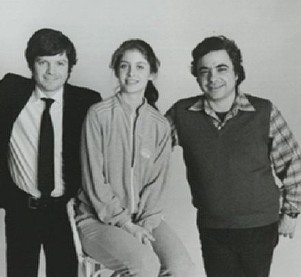 Just imagine: Alexander and Ilya Salkind present Director Robert Wise's "Supergirl: The Movie", based on the original script by David Odell, with stars Christopher Reeve as Superman, Dolly Parton as Madame Selena, and Brooke Shields as Supergirl. This epic opens in flashback as Krypton explodes much as it did in the first "Superman" movie. Except on the other side of the planet, Argo City survives the cataclysm. It's a young, pre-teen Kara of Argo who inadvertently loses the Omegahedron power source where it ends up in the hands of a simple farm girl played by Dolly Parton who becomes evil through contact with it. Superman is magically made old and sick and rendered powerless for most of the movie. Supergirl retrieves the Omegahedron, saves Superman, saves the Earth, frees Selena's mind, and returns to Argo with the Omegahedron and a newly reformed Selena. All of these things - and Brainiac too -- were considered at one point or another in the development of 1984's "Supergirl".
Just imagine: Alexander and Ilya Salkind present Director Robert Wise's "Supergirl: The Movie", based on the original script by David Odell, with stars Christopher Reeve as Superman, Dolly Parton as Madame Selena, and Brooke Shields as Supergirl. This epic opens in flashback as Krypton explodes much as it did in the first "Superman" movie. Except on the other side of the planet, Argo City survives the cataclysm. It's a young, pre-teen Kara of Argo who inadvertently loses the Omegahedron power source where it ends up in the hands of a simple farm girl played by Dolly Parton who becomes evil through contact with it. Superman is magically made old and sick and rendered powerless for most of the movie. Supergirl retrieves the Omegahedron, saves Superman, saves the Earth, frees Selena's mind, and returns to Argo with the Omegahedron and a newly reformed Selena. All of these things - and Brainiac too -- were considered at one point or another in the development of 1984's "Supergirl".Ultimately Reeve didn't participate. Salkind chose director Jeannot Szwarc over Wise. Szwarc had previously directed 1978's "Jaws 2". Odell's script saw massive rewrites to accommodate casting changes. Faye Dunaway stepped into the Selena role. Salkind convinced his father to go with an unknown Helen Slater rather than Shields. "The Odell script was day and night. I mean that would have been a great picture," Salkind said.
Salkind believes "Supergirl" director Szwarc may have been "too easy". As Salkind recalled: "With Dick (Donner) we had fantastic fights. With (Lester) we had fantastic fights. With Jeannot not so many and that was a problem. He was a little too sweet."
The final film "was OK, it went more the lyrical, kind of Jeannot-style, which was wonderful," Salkind related. "I really think the film was not a bad film at all. The score was fantastic. The longer cut of course was better." The longer cut was released internationally and on Anchor Bay's 2000 special edition DVD.
Part of the reason that "Supergirl" may not have been more successful, Salkind believes, may have to do with the viability of a super-strong female protagonist. "I think stronger-than-men women heroes don't work," Salkind said. "'Sheena' didn't work. 'Catwoman', let's not even go there," he chuckled. Salkind posited "Charlie's Angels" as an example of female heroes that work well on screen.
Boys Will Be Superboys
 After more than a decade spent working on projects involving Kryptonians, Salkind thought he was finished with super characters. Instead he turned his attention to jolly old Saint Nick in 1985's "Santa Claus: The Movie". By this time, the Salkinds had already begun negotiating to transfer the license to produce one "Superman" movie to the Canon Group, which eventually resulted in 1987's "Superman IV: The Quest for Peace." Salkind and his father received a credit in the Sydney Furie-directed film for initiating the Superman film franchise.
After more than a decade spent working on projects involving Kryptonians, Salkind thought he was finished with super characters. Instead he turned his attention to jolly old Saint Nick in 1985's "Santa Claus: The Movie". By this time, the Salkinds had already begun negotiating to transfer the license to produce one "Superman" movie to the Canon Group, which eventually resulted in 1987's "Superman IV: The Quest for Peace." Salkind and his father received a credit in the Sydney Furie-directed film for initiating the Superman film franchise.Around the same time, someone suggested a young Superman series to Salkind's father, Alexander, and syndication giant Viacom quickly became very excited about the concept. Though the junior Salkind had decided not to work with Alexander again after "Santa Claus: The Movie", the production agreement required there be a Salkind in charge. "He [Alexander] had to make a deal with me and make me an offer I couldn't refuse, which was nice," Salkind remembered. Salkind agreed to produce the show for "a lot of money... up front."
"Superboy" initially settled in Texas, but then moved to Orlando, Florida. Disney had just started their production studio - Disney/MGM Studios - and "Superboy" was the first series shot there. After the first season, the show moved to bigger quarters at Universal Studios Florida, also in Orlando.
"At the beginning, I was really laid back and delegated completely to [Line Producer] Bob [Simmonds] except the casting," Salkind said, admitting "Frankly, I was a little lazy." Simmons and writer Fred Friedberger crafted relatively down-to-earth adventures with few special effects. Salkind explained that DC Comics still retained the right to intervene but rarely did. "[T]hose were very down to earth little episodes with very little to do," he related about those early shows.
One area that Salkind did participate in was casting the show. In the first season, John Haymes Newton played Clark Kent and Superboy. Stacy Haiduk portrayed the red-headed sweetheart from Smallville, Lana Lang. James Calvert was Clark's college roommate and son of the Daily Planet's Editor in Chief, T.J. White. Scott Wells played a young Lex Luthor in several first season episodes.
"Of course I cast the kid [Haymes Newton]; the kid was great," Salkind said. "I cast the girl [Haiduk], who was out of this world. She was the one who made the show." Salkind admits that he hired Wells to play Lex because he was looking for "very good-looking people" and that "this Luthor was very good-looking but a terrible actor."
The show opened with strong ratings. "We were huge in syndication when it opened with the bad shows," Salkind noted. As a hands-off producer, he was happy with the ratings and assumed that meant everything was fine. "Then I started getting these letters that Viacom sent me from the stations saying 'This is a piece of sh*t show; this is not up to the standards of the Salkinds. What the f*ck is he [Salkind] doing?'"
Salkind then spoke with a Viacom executive who wanted to know "'what's going on, this is a sh*tty show.' And I said... [w]e have a 6.5, what the f*ck do you want? It [was] number 11 or 12 [in the syndicated ratings]. That was terrific because up there was only 'Wheel of Fortune' and stuff like that."
Salkind took Viacom's rumblings as a wake-up call. He looked at the first few episodes and wondered: "'Where are the bigger than life challenges' - that he's going after a guy doing a little tax evasion or whatever [which was] ridiculous." Salkind assumed a much more hands-on role in the show. "We started changing [and t]hen it got better and better. The last three [episodes of the first 13], we started making better ones. Then Cary Bates came on [as a writer] and then it really [took off]. We started bringing Bizarro and all kind of things [from the comics]."
The show's ratings eventually rose to around 7.2 which was "pretty much the same ratings but the show was better reviewed," Salkind said. "It was a huge hit for that kind of series."
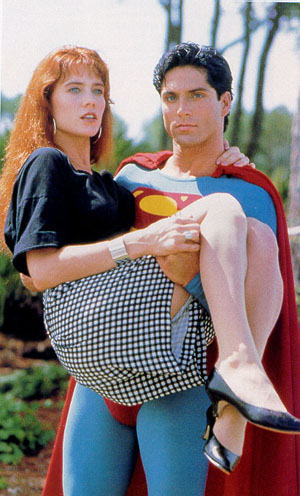 In an unprecedented move, Salkind replaced three of the four principals - Haymes Newton, Calvert, and Wells -- after the first season, keeping only Haiduk whom he describes as "dynamite."
In an unprecedented move, Salkind replaced three of the four principals - Haymes Newton, Calvert, and Wells -- after the first season, keeping only Haiduk whom he describes as "dynamite."
Haymes Newton had become difficult on and off the "Superboy" set during the season. "He became, at the end [of season one] impossible because we had a morals clause in all the deals with the super-heroes that they couldn't drink, there were certain things.... And he got drunk and arrested and it set a bad example for the kids." At the same time, Haymes Newton was pushing for a raise. According to Salkind, "then he wanted a raise and the show was doing the same ratings [consistently all season] so there was no reason. At that point, I said this can't work and I did something." What Salkind did was fire Haymes Newton and replace him for the remainder of the series with actor Gerard Christopher.
Salkind has fond memories of Haymes Newton's performance. "Look he was a good Superboy," Salkind said emphatically. "If he wouldn't have f*cked around, he'd have been OK." Salkind recently reunited with the first season cast to work on the DVD set. According to Salkind, Haymes Newton "grew up; he's a brilliant adult. He's a good actor."
Also in season two, Salkind replaced Jim Calvert's character with Ilan Mitchell-Smith's Andy McAllister. "[Calvert] was not strong enough.... [Mitchell-Smith] had a different quality."
Finally, the biggest physical change in the cast concerned Lex Luthor. "[Wells] was getting better at the end because I had him take some courses in dramatic arts," Salkind said. Nonetheless, Salkind replaced Wells with the much older, much taller, much more menacing Sherman Howard. "Luthor was the big coup [of season two] because I invented the story where he aged 20 years and grew five inches taller and I [cast] Sherman Howard who was absolutely incredible."
The show drew on its comic book roots often, introducing live-action versions of comic book staples Metallo, Bizarro, Mr. Mxyzptlk, the Kryptonite Kid, and the Yellow Peri. Comic book writer Bates was joined over the course of the series by other comic book writers like Denny O'Neil, Andrew Helfer, J.M. DeMatteis, and Mike Carlin. Experienced television writer and Superman fan, Mark Jones, and Bates eventually became story consultants.
Salkind also wrote several episodes of the series. "I did 'Young Dracula' with Cary [Bates] and also the episode with Johnny Casanova," he said.
End (Super) Run
"Superboy" broke new ground in syndicated programming. Along with "Star Trek: The Next Generation", it was one of the first original programs created for syndication that was a dramatic big budget series, not a talk show or game show. Although "Superboy" was a Salkind production of a Warner property, it was distributed in the United States by Viacom, which merged with Paramount in 1994.Because of the number of different companies involved in making "Superboy", and due to legal issues between Salkind and Time Warner that took time to settle, the series has never been seen beyond its initial syndicated run. Though Time Warner owns all the footage to every other Salkind production of a Superman property exclusively, it shares ownership of the "Superboy" footage with Viacom/Paramount and Salkind. The show appears headed for a first season DVD release later this year (2006).
After having produced "Superboy" for several years, Salkind recalls that he got Superman "back in the blood." He decided to return to the world of "Superman" movie-making.
Salkind wrote the story for "Superman V" (also known as "Superman: The New Movie" and "Superman Reborn") with "Superboy" writers Bates and Jones. "The script was frankly... the best one since [Superman] II or III," Salkind divulged. "It was Brainiac and the city [of Kandor] encapsulated. It was fantastic." In this un-produced script, Superman dies and is resurrected in the shrunken, bottled Kryptonian city of Kandor. The script for "Superman V" involving the Man of Steel's death and rebirth predates DC's "Death of Superman" storyline which began late in 1992.
Salkind, Bates, and Jones developed a first and second script. Salkind even considered casting Reeve in the title role again. "I went to see Chris Reeve. We had lunch at the Carlisle in New York.... Chris was ready to do it."
By that time, Warner Brothers developed a renewed interest in the DC Comics icons with the success of 1989's "Batman." According to Salkind, "Warners just started to [make] problems, constantly saying to DC that it ["Superman V"] wouldn't work." A spate of lawsuits arose. Salkind maintained Warner tried to stop "Superman V" and a fifth season of "Superboy" to pave the way for 1993's "Lois & Clark: The New Adventures of Superman".
Whatever the reason, Salkind eventually gave in. "Superboy" ceased production after the fourth-season-ending 100th episode. "Superman V" never happened. And Salkind set sail on another film. "'Columbus' came up and we just gave up [and moved on]," Salkind said.
Discoveries
Salkind had become professionally estranged from his father after working on "Santa Claus". "My father changed a lot," he recalled. "After 'Santa Claus', I had decided not to work with him again. Let's say he got a little too difficult with little people who need to be paid. That's where we really started to have very big differences.""We were on the breaking point since [19]85. We separated, then I came back. I didn't want to be a partner anymore, was just an employee. And then it got worse and worse." The pair came together in name only on "Superboy".
Ironically, Salkind's professional relationship with his father ended where it initially flourished - beside screen legend Brando. 1992's "Christopher Columbus: The Discovery" starred Brando as Tomas de Torquemada. Shooting on location, Brando convinced Salkind to make the characters more historically accurate. "Brando and I had revised the script to make Columbus much more a son of a... correctly portrayed... meaning he was not such a nice man." Salkind remembered that the Spanish government was extremely sensitive about Columbus's legend. "Of course we had the Government of Spain giving us the boats and they were on our backs. We had to make them all happy. Everything had to be nice and rosy; Columbus was a hero. Torquemada was supposed to be a nice boy when he tortured people in boiling oil," Salkind joked.
"Brando had absolutely convinced me to rewrite the [script] and he just wanted a ridiculous one percent of the profits to do it. My father came [on location] and he was scared of the Spaniards. Anyway, we didn't do it. So since then he [Brando] really didn't like my father. They were very good friends before... [a]nd actually when I had my big problems with my father, [Marlon] was on my side." Brando had threatened to remove his name from the "Columbus" credits. The film sank at the box office only earning a domestic gross of slightly over $8 million.
Then Salkind's relationship with his father hit a literal breaking point. In November 1993, Salkind and his third wife, Jane Chaplin (daughter of screen legend Charlie Chaplin), along with co-producer Simmonds (who worked on the first three "Superman" movies and "Superboy"), sued Salkind's father in Los Angeles. The plaintiffs alleged that Alexander owed each of them money from "Columbus"; however the most stunning allegation concerned the almost $7 million claimed to be owed to Chaplin that she purportedly lent father-in-law Alexander to keep the production afloat. "[T]he Jane thing was the topper," Salkind said. Between the creative differences on the "Columbus" script and the mishandled finances, Salkind's relationship with his father had dissolved professionally and emotionally. Alexander died in 1997.
Déjà vu-El (a.k.a. "Superman Returns")
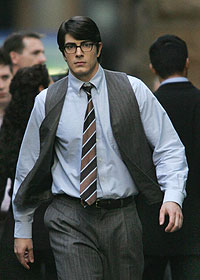 Salkind referred to 2006 as a "good year for Superman fans" and there's of course one principal reason - "Superman Returns" opens June 30, 2006 starring newcomer Brandon Routh as the Man of Steel, Kevin Spacey as Lex Luthor, and Kate Bosworth as Lois Lane. The new film takes concepts and set designs (plus one actor) from Salkind's first two "Superman" movies.
Salkind referred to 2006 as a "good year for Superman fans" and there's of course one principal reason - "Superman Returns" opens June 30, 2006 starring newcomer Brandon Routh as the Man of Steel, Kevin Spacey as Lex Luthor, and Kate Bosworth as Lois Lane. The new film takes concepts and set designs (plus one actor) from Salkind's first two "Superman" movies.As the originator of the films on which director Bryan Singer based the new movie, Salkind believes its success lies in respecting what's come before rather than attempting to supplant it. "[T]he direction that Bryan took is brilliant because he is not going to be compared to [the original film.]"
The teaser trailer released in late 2005 featured narration by Brando's Jor-El and Williams' familiar score. "That nailed it. Of course it's my f*cking film - my Brando, my music, my Krypton," Salkind laughed.
"What is great there - they hit it on the nose - because it goes so well with where we are in the world. It is saying one simple thing. A good guy's coming back and he's the biggest." Salkind distinguished Superman from the darker heroes of most of the recent comic book movies. "Now if you look at all the last pictures of comic books, they're all not that good. Batman is a complex, f*cked up guy. "Hellboy." "Daredevil." I mean there hasn't been one [since Superman]. He's the guy. And he's coming back right when we desperately need heroes again - a bit like when we opened with Reagan and stuff like that."
Needless to say, Salkind is very optimistic about the film's chances for success. "What I've heard is fantastic and what I've seen looks very good," Salkind shared. "I think the movie is going to be absolutely gigantic. First Bryan is good. Second Brandon is respectful of Chris [Reeve] and that's very important.... I'm very happy that Bryan went with Routh."
One big change from the Salkind film series is the costume design. "I think they experimented a little too much. I don't know if they needed to change much," Salkind revealed. Ultimately, however, Salkind thinks most people won't notice the difference in the costume because the performance will evoke Reeve's performance. "I think it's going to work.... I don't think people will even notice [the costume deviations] because they're going to see Chris Reeve - that's my gut feeling."
Salkind even agrees with the film-makers' decision to ignore "Superman III" and the films that followed. "III was just a separate adventure.... There was no reason for him to leave Earth after III when he fixed everything, including the Tower of Pisa," he joked. "III was not a cosmic adventure."
Salkind did an interview recently for Kevin Burns' Superman documentary, "Look Up In The Sky: The Amazing Story of Superman". "I had a fantastic interview - two and a half hours. Very clever man. He's doing a great job and he interviewed a lot of people already." The docu-film will bow sometime this Spring.
Conclusion
Over the years, the Salkinds have been largely vilified for some of their production decisions on "Superman" and "Superman II". Salkind believes that's unjust. "That's very unfair when you have people saying that the Salkinds [are] bastards. Without us, there would be nothing and credit goes to [my father]. I got the credit coming up with it but, without his money, there would be no movie.... The fact that he believed in me, that he trusted me and that he found the means to do it - you know he's the guy. Without him, there would be no bloody Superman movie. Or all these other comic book movies [that followed]."Salkind is looking forward to the opportunity to provide interviews and commentaries for the planned 14-disc "Superman: Ultimate Collector's Edition" that promises new DVDs of the four "Superman" movies and "Supergirl". "I'll have the interviews on all the movie DVDs which will set the record straight," he said.
"So many people have worked on this - and this is what bothers me the most - is when there is kind of this tendency for some people to say, 'I did it all.' Well nobody did it all."
"Everybody deserves credit for what they did."
 After "Columbus", Salkind made the United States his permanent professional home. Today "The Ilya Salkind Company, Inc." works out of Los Angeles. Later this year sees the release of Salkind's "Alexander the Great of Macedonia". Like Superman, "it's another good role model but it's a real guy," Salkind explained.
After "Columbus", Salkind made the United States his permanent professional home. Today "The Ilya Salkind Company, Inc." works out of Los Angeles. Later this year sees the release of Salkind's "Alexander the Great of Macedonia". Like Superman, "it's another good role model but it's a real guy," Salkind explained.
Also in the works are film projects based on the Abominable Snowman ("it has a bit of environmental subtext"), Queen Nefertiti of Egypt, and the Missing Link ("I'm working with [Cary] Bates on it actually"), among others. "If you look at those... pictures, they all have a subtext that is positive," Salkind noted. "My real goal now is to make great movies and hopefully enjoyable movies."
"When you make films or write or paint, you can live through that all your life. You find yourself through the films, the paint. I must say it took me a long, long time - 30 years of therapy as well - but I am now - I'm not Superman on the screen - I am a man who is a good man on Earth."
"I know a lot of people who are exactly what they were 20 years ago. It's the Oscar Night. It's the money. It's the glory. It's the power. And to me that is absolutely not important. What is important is what you can do with it - that's important. Let's face it. Santa Claus and Superman are perhaps the two best guys in the world. And the Musketeers represent the most beautiful friendship ever. I think those are values that are there [in my films] and they are very important."
Given the choice of completely embracing father Alexander's no-holds-barred style, or finding a way to incorporate aspects of his mother's sensitivity and code of conduct into his profession, Salkind believes he has finally "embraced the light side."
"Like in 'Superman III'", he concluded. "I'm still a very young old fan of Superman and always will be."
Photographs (from top to bottom):
